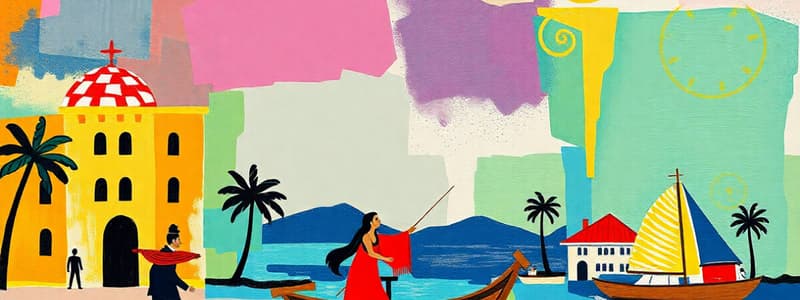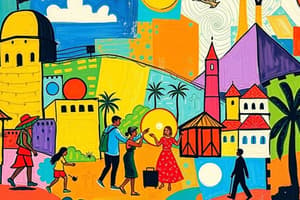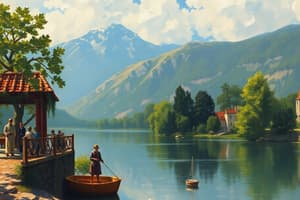Podcast
Questions and Answers
A traveler who consistently seeks out novel and unique experiences, differing from typical tourist destinations, would be best classified as:
A traveler who consistently seeks out novel and unique experiences, differing from typical tourist destinations, would be best classified as:
- Psychocentric
- Mid-Centric
- Business Traveler
- Allocentric (correct)
Which of the following scenarios best exemplifies incentive travel?
Which of the following scenarios best exemplifies incentive travel?
- A family taking a summer vacation to Disneyland.
- A group of employees being sent on a tropical cruise as a reward for exceeding sales targets. (correct)
- A couple visiting various historical sites and museums during their holiday.
- An individual traveling to a remote village to study local weaving techniques.
A tour operator is designing a travel package that includes hiking through national parks, rock climbing, and white-water rafting. Which type of tourism best describes this package?
A tour operator is designing a travel package that includes hiking through national parks, rock climbing, and white-water rafting. Which type of tourism best describes this package?
- Adventure Tourism (correct)
- Resort Tourism
- Rural Tourism
- Cultural Tourism
A group of archaeologists is planning a trip to an ancient dig site in Egypt to study hieroglyphs and artifacts. This travel can be classified as which type of tourism?
A group of archaeologists is planning a trip to an ancient dig site in Egypt to study hieroglyphs and artifacts. This travel can be classified as which type of tourism?
A person who organizes a trip to a wellness center in another country to undergo a specialized surgical procedure is an example of:
A person who organizes a trip to a wellness center in another country to undergo a specialized surgical procedure is an example of:
In a cultural setting where elders are highly respected, what is the MOST appropriate action to take at the start of a shared meal?
In a cultural setting where elders are highly respected, what is the MOST appropriate action to take at the start of a shared meal?
A tour guide encounters a situation where a planned historical site is unexpectedly closed. Which action BEST demonstrates adaptability?
A tour guide encounters a situation where a planned historical site is unexpectedly closed. Which action BEST demonstrates adaptability?
Which practice exemplifies responsible tourism regarding waste management?
Which practice exemplifies responsible tourism regarding waste management?
What action demonstrates a commitment to conserving resources as a socially responsible traveler?
What action demonstrates a commitment to conserving resources as a socially responsible traveler?
A tour guide is leading a group through a historical site when a member gets separated from the group. What should the tour guide do FIRST?
A tour guide is leading a group through a historical site when a member gets separated from the group. What should the tour guide do FIRST?
A tour guide is leading a group with diverse cultural backgrounds. Which strategy would be MOST effective for the guide to employ to ensure a positive and respectful experience for everyone?
A tour guide is leading a group with diverse cultural backgrounds. Which strategy would be MOST effective for the guide to employ to ensure a positive and respectful experience for everyone?
A tour company is planning excursions for travelers who have previously visited popular tourist destinations. To cater to their interests, which type of tour would likely be MOST appealing?
A tour company is planning excursions for travelers who have previously visited popular tourist destinations. To cater to their interests, which type of tour would likely be MOST appealing?
A group of tourists from various countries is visiting Thailand. Which of the following is NOT a crucial piece of advice to provide them with, according to the information?
A group of tourists from various countries is visiting Thailand. Which of the following is NOT a crucial piece of advice to provide them with, according to the information?
Singapore has strict laws regarding public behavior. Which of the following activities could lead to serious consequences for a tourist?
Singapore has strict laws regarding public behavior. Which of the following activities could lead to serious consequences for a tourist?
How can tour guides effectively cater to the evolving preferences of modern travelers who are increasingly exposed to diverse cultures and have higher expectations for service?
How can tour guides effectively cater to the evolving preferences of modern travelers who are increasingly exposed to diverse cultures and have higher expectations for service?
Flashcards
Psychocentric Traveler
Psychocentric Traveler
Prefers safe, familiar destinations.
Allocentric Traveler
Allocentric Traveler
Seeks new experiences and adventure.
Mid-centric Traveler
Mid-centric Traveler
Prefers a mix of safe and new experiences.
Business Travel
Business Travel
Signup and view all the flashcards
Leisure Travel
Leisure Travel
Signup and view all the flashcards
Sports tourism
Sports tourism
Signup and view all the flashcards
Diversity in group travel
Diversity in group travel
Signup and view all the flashcards
Evolving traveler expectations
Evolving traveler expectations
Signup and view all the flashcards
Growth of international travel
Growth of international travel
Signup and view all the flashcards
Cultural sensitivity
Cultural sensitivity
Signup and view all the flashcards
When to start eating?
When to start eating?
Signup and view all the flashcards
Table manners: Food
Table manners: Food
Signup and view all the flashcards
Tour guide's role
Tour guide's role
Signup and view all the flashcards
Socially responsible travel
Socially responsible travel
Signup and view all the flashcards
Support local businesses
Support local businesses
Signup and view all the flashcards
Study Notes
- Chapter 3 focuses on the classification of travelers.
Personality
- Psychocentric travelers prefer safe and familiar destinations.
- Allocentric travelers seek new and unique experiences.
- Mid-centric travelers prefer a balance between familiar and new destinations.
Travel Purpose
- Business travel is undertaken for work-related reasons.
- Pleasure travel is for leisure, including family vacations, resort trips, or solo travel.
- Medical travel is undertaken for medical purposes.
Baseline Characteristics
- Some travelers have pre-existing medical conditions or vulnerabilities.
- Long-term travel involves extended periods away from home.
Explorers
- Engage fully with the destination's environment.
- Willingly adapt their behavior to the environment they are in.
Group Travel
- Travel with a group involves a group of people.
- Often organized through a tour company.
Resort Travelers
- Prioritize rest and rejuvenation.
- Seek beautiful and easy-to-travel locations.
Adventure Tourism
- Involves physical activities in nature.
- Activities are generally carried out in the open air.
Business Tourism
- The primary motivation for the trip is business or professional reasons.
Leisure Travelers
- Travel for personal reasons.
- Reasons include relaxation, entertainment, or recreation.
- May involve sightseeing, visiting family/friends, or taking a vacation.
Incentive Travelers
- Receive an all-expenses-paid trip as a reward.
- Rewards are given for achieving goals or milestones.
- Incentive travel programs are used by businesses.
- Programs exist to motivate and recognize employees or customers.
Cultural Travel
- Involves learning about a place's history, traditions, and culture.
- Also known as immersive or experiential travel.
Expedition Members
- Include people, animals, or things that are part of a group.
- Expeditions involve journeys or trips that have a specific purpose.
Mountain Tourism
- Takes place in mountainous areas.
- Includes activities like walking, climbing, and winter sports.
Rural Tourism
- Involves participating in the rural lifestyle.
- Activities are often nature-based.
- Can involve cultural activities and learning about local history/heritage.
Sports Tourism
- Traveling to participate in or watch a sporting event.
- Combines a love of sports with a desire to experience new places.
The Challenges of Group Travel
- A group is a collection of unique individuals.
- Guides must offer a more personalized level of service.
- Changes in society and the traveling public present new challenges.
- Guides are called upon to meet these challenges.
- Travelers come from different countries and have diverse tastes, behaviors, and values.
- Guides must develop a deeper understanding of various countries and cultures.
- Travelers are exposed to other cultures via media.
- Guides must provide a broader and more cosmopolitan perspective.
- Travelers may be more discriminating and demanding due to having traveled more.
- Some travelers want to see more in less time, while others prefer in-depth experiences.
- Some travelers prefer unusual places over popular regions.
- Guides must specialize in a wide variety of areas (nature, architecture, languages).
International Travelers
- International travel is growing in popularity.
- Those who work with foreign guests must be familiar with various cultural norms.
- Cultural norms include greetings, punctuality, gift-giving, clothing, and body language.
- This is because it can be difficult to understand customs and personalities.
Social Norms by Country
- Singapore has laws against chewing gum and spitting in public, with associated fines.
- Smoking in public in Singapore can lead to serious trouble.
- In Thailand, it is important to respect the Thai King.
- Individuals should always carry a passport and avoid illegal drugs.
- The legal drinking age in Thailand is 20.
- It is important not to overstay one's visa.
- In Korea, shoes must be taken off when entering someone's house.
- It is impolite to start eating before the oldest person at the table.
- Commenting on or smelling food before eating is impolite.
Various Roles of a Tour Guide
- Includes primary roles.
Primary Role of a Tour Guide
- Includes primary roles.
Responsibilities of a Tour Guide
- Provide information: Share details about the history, purpose, and architecture of a site.
- Tell stories: Share stories about people and events associated with a site.
- Manage itineraries: Ensure the tour's itinerary is followed.
- Ensure safety: Ensure the safety of the group and that they remain together.
- Respond to emergencies: Provide assistance in emergencies.
- Comply with regulations: Ensure compliance with establishment or tour regulations.
- Adapt to needs: Adjust the pace, content, and style of the tour.
- Adjustment should be used to match the interests of the group.
- Solve problems: Use creative thinking and quick decision-making.
- This skill is required to find solutions to problems.
Skills of a Tour Guide
- Knowledge: Have extensive knowledge of local history, attractions, and archaeological sites.
- Adaptability: Remain flexible and able to adjust plans at a moment's notice.
- Problem-solving: Must Be able to think quickly and find solutions to problems.
- Time management: Balance the need to cover all planned stops with flexibility.
Socially Responsible Traveler
- Key elements to consider
- Plan: Research the destination and look for sustainable accommodations, tour operators, and transportation.
- Support local businesses: Buy local items and souvenirs, and hire local guides.
- Respect local culture: Learn about the local customs and traditions.
- Reduce waste: Avoid single-use plastics and bring reusable bags, water bottles, and utensils.
- Conserve resources: Take shorter showers, turn off lights and air conditioning when leaving, and reuse towels.
- Reduce carbon footprint: Walk, cycle, or use public transportation when possible.
- Leave no trace: Pick up trash, stay on designated trails, and respect wildlife.
- Educate yourself: Learn about the environmental and social issues in the destination.
- Volunteer: Volunteer time to help the local community.
A Tour Guide's Primary Roles
- Leader: Guides must navigate groups, provide access, maintain control, and manage tensions.
- Guides must also entertain and make decisions.
- Educator: They impart historical, cultural, and geographic knowledge.
- Public Relations Representative: They represent countries and businesses.
- Host: They make travelers comfortable, enjoy people, and extend help.
- Conduit: Guides emphasize the visitor experience over their own performance. -These interrelated roles vary but are essential for a successful experience.
Synthesis and Application of Roles
- Guiding is an individual and creative endeavor.
- A clearer picture arises concerning the desirable qualities of guides and their possible courses of study.
- Fulfilling the different tasks of a guide simultaneously can be challenging.
- Some guides fulfill their roles concurrently naturally, while others find it difficult.
- Experience has shown that many of the skills can be taught.
Synthesis and Application of Roles (cont.)
- Five key roles pertain to the guide's image.
- These are the roles that the visitor and the industry expect of a professional.
- Guides must build identities as educators, researchers, guests, or businessmen.
- Image is what is perceived by others; identity is what one actually is.
Studying That Suits You
Use AI to generate personalized quizzes and flashcards to suit your learning preferences.




